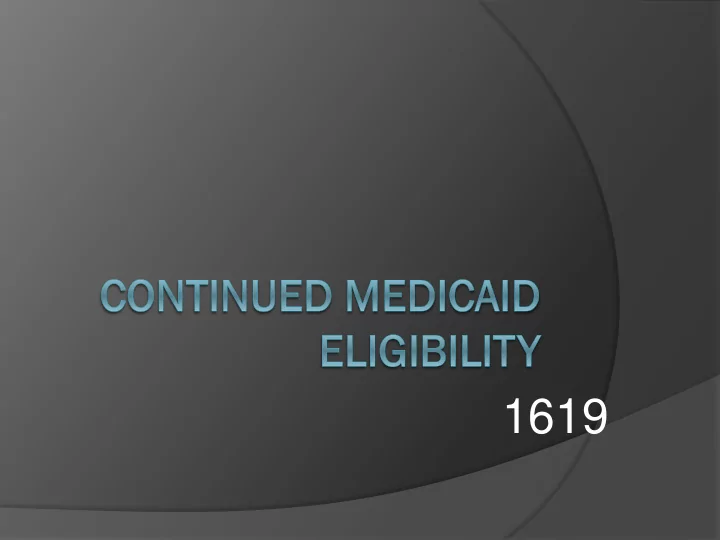

1619
The Start of 1619 Congress first passed the SSI income support program in the early 1970’s,the program had a number of structural flaws that ironically discouraged people with disabilities who wanted to work. After a short trial work period, an individual was evaluated to see if they continued to meet Social Security Administration (SSA) technical definition of disability. Substantial earnings would lead to a loss of "disability" status and eventually loss of benefits and medical assistance under Medicaid. The problem was that the amount of earnings that would cause an individual to no longer be "disabled" was lower than the federal benefit level for SSI payments. Consequently, attempting work would not cause people to lose their SSI in itself, but could cause them to lose their "disability status" and thus not eligible for SSI and Medicaid because they no longer met SSA's statutory definition of disability. Many people lost their SSI even though they were technically eligible to receive SSI based on their income.
Continued Concerned that 1619 was being underutilized by SSA and inaccessible to people with disabilities, Congress made significant changes and enacted the provisions as law as part of The Employment Opportunities for Disabled Americans Act in 1987, Section 1619 of this law had two primary provisions: 1619 A and 1619 B.
What is 1619(a)? Section 1619(a) did away with the trial work period for SSI recipients, wisely noting that work in itself does not change the fact that someone has a disabling impairment or is blind once they are on the SSI rolls. For SSI purposes under 1619(a), disability status continues until a person's impairment medically improves or is terminated for a non-disability reason.SSI checks are reduced in proportion to actual earnings and recipients could work their way off SSI instead of losing it outright.
What is 1619(b)? Section 1619(b) clarifies protection against the loss of Medicaid coverage for people whose earnings make them ineligible for any further SSI cash payments. Eligibility for 1619(b) Medicaid coverage is based on the following conditions: (1) termination of Medicaid benefits would “seriously inhibit the individual’s ability to continue working; and; (2) the individual’s earnings are “insufficient for the individual to provide a reasonable equivalent of the benefits which would otherwise be available to him or her under SSI and Medicaid if they did not have earnings.”
One of the biggest concerns SSI beneficiaries have about going to work is the possibility of Losing Medicaid coverage. Section 1619(b) of the Social Security Act provides some protection for these beneficiaries. To qualify for continuing Medicaid coverage, a person must: Have been eligible for an SSI cash payment for at least 1 month; Still meet the disability requirement; and Still meet all other non-disability SSI requirements; and Need Medicaid benefits to continue to work; and Have gross earnings that are insufficient to replace SSI, Medicaid and publicly funded attendant care services.
What is 1619(b) in Oklahoma? A person with a disability in the State of Oklahoma can get a job and make up to $30,310 and still qualify for the 1619(b) program.
Recommend
More recommend